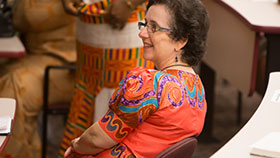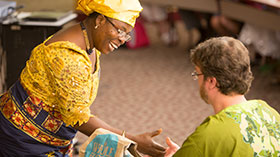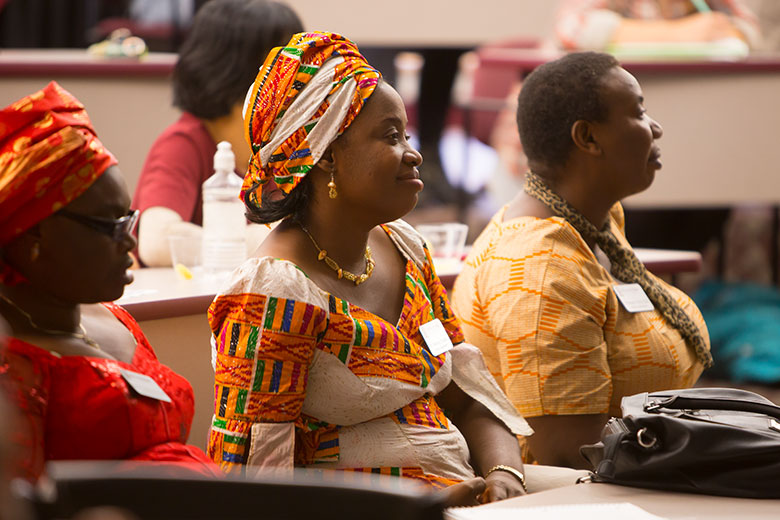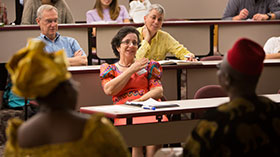Nigerian women can treat malaria, but few study hard sciences
 Dr. Jamaine Abidogun, professor of history at Missouri State University, has been interested in Nigeria and indigenous knowledge for a number of years. She won her first Fulbright award to conduct research in Nigeria in 2004-05 and completed her second research trip in 2014. She learned that many Nigerian girls and women have a great deal of indigenous knowledge related to medicine and agriculture, but few of them pursue formal education in the hard sciences. She wanted to know why.
Dr. Jamaine Abidogun, professor of history at Missouri State University, has been interested in Nigeria and indigenous knowledge for a number of years. She won her first Fulbright award to conduct research in Nigeria in 2004-05 and completed her second research trip in 2014. She learned that many Nigerian girls and women have a great deal of indigenous knowledge related to medicine and agriculture, but few of them pursue formal education in the hard sciences. She wanted to know why.
“In this Fulbright research project, the main goal was to identify indigenous knowledge, specifically science knowledge, and see how it can be used in formal education and the sciences to help increase women’s participation by the time they get to higher education, to university level,” said Abidogun.
Igbo women act as herbalists, healers
Abidogun primarily studied the Igbo culture in her most recent research. She was surprised about the amount of indigenous knowledge that is still in practice.
“So we met a man and his son that have a thriving business in setting bones,” she said. “While a lot of that practice was banned during colonialism, in the last 10 or 15 years they’ve actually been asked to come into the Western clinics and hospitals that are Nigerian-run to demonstrate their techniques, because they have a better rate of retaining muscle mass with recovery of broken bones..
 “And then for the women, so many women still used most of the herbal remedies from their grandmothers and great-grandmothers. Even though they had access to clinics, they said they just knew that practices of their ancestors worked and there wasn’t any reason to go pay a doctor’s fee when you knew that these things were taking care of it.”
“And then for the women, so many women still used most of the herbal remedies from their grandmothers and great-grandmothers. Even though they had access to clinics, they said they just knew that practices of their ancestors worked and there wasn’t any reason to go pay a doctor’s fee when you knew that these things were taking care of it.”
Abidogun said Igbo women are responsible for taking care of their daughters after they give birth; and the practices they use to prevent bleeding or hemorrhaging is nearly identical to Western medicine practices. In addition, indigenous herbs are used that support these practices.
“Women traditionally hold a significant amount of medical knowledge, even if they’re not officially herbalists,” she said. “Out of the people that I interviewed both this time and some interviews that I did in 2004-05, any adult woman could give me the basic remedies for malaria or dysentery. They knew the basic properties of several herbal plants – like for stomachaches you use lemon grass.

Indigenous knowledge does not lead to formal education
Despite the fact that many Igbo women and girls know a great deal about medicine and agriculture, Abidogun said the number of girls who study hard sciences – such as chemistry, biology, physics or astronomy – is very low.
“The education system is really strong in terms of the hard sciences, but the integration of indigenous knowledge is really lacking because, just like a lot of other cultures, ours included, people tend to think of it as folk lore.” — Dr. Jamaine Abidogun
 Abidogun and her colleagues from Missouri State and the University of Nigeria are developing curriculum that would incorporate indigenous knowledge into the teaching of hard sciences. They are optimistic that their recommendations may be implemented by the Enugu State Board of Education.
Abidogun and her colleagues from Missouri State and the University of Nigeria are developing curriculum that would incorporate indigenous knowledge into the teaching of hard sciences. They are optimistic that their recommendations may be implemented by the Enugu State Board of Education.
“I really hope and I think that we’ve made some of the right contacts to, one, integrate as much indigenous science as possible into the national science curriculum for Nigeria,” said Abidogun. “Then, two, see that the historical gender assignments are talked about and included in that curriculum so that girls in particular, but also boys, have a respect for the fact that science is for both genders.”

